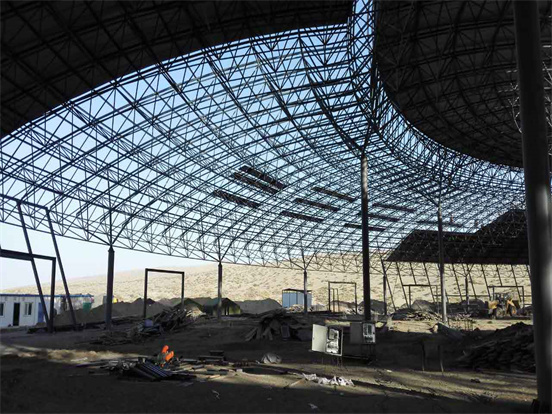Space Frame Structures: Types and Benefits
Space frame structures are a remarkable architectural and engineering innovation that have gained popularity due to their unique design and numerous advantages. These structures are composed of lightweight, rigid components arranged in a geometric pattern to create a three-dimensional framework. The result is a strong, versatile, and visually striking construction system. In this article, we'll explore the types and benefits of space frame structures.
Types of Space Frame Structures:
Linear Space Frames: Linear space frames are the simplest form of space frames and consist of straight members connected at their ends to form a structure resembling a grid. They are commonly used in industrial and commercial buildings, providing an open and spacious interior with few supporting columns.
Curvilinear Space Frames: Curvilinear space frames are designed with curved or arched components, allowing for more complex and aesthetically pleasing shapes. These structures are often used in architectural landmarks, such as sports stadiums, airports, and exhibition centers, where their striking designs capture attention.
Double-Layer Grids: Double-layer grids are space frames constructed with two layers of members, one above the other, creating additional depth and strength. This type is ideal for large spans and can be seen in applications like airport terminals and industrial warehouses.
Single-Layer Grids: Single-layer grids have a single layer of members, making them lighter and suitable for smaller to medium-sized spans. These structures are commonly used in sports arenas, shopping malls, and convention centers.
Kiewitt Domes: Kiewitt domes, named after their inventor, are a type of space frame structure with radial, symmetric, or near-symmetric geometry. Their unique design allows them to cover large areas with minimal materials, making them a cost-effective choice for applications like exhibition halls and gymnasiums.

Benefits of Space Frame Structures:
High Strength-to-Weight Ratio: Space frames are incredibly lightweight compared to traditional building materials like steel and concrete. Their high strength-to-weight ratio allows them to span large distances with minimal material usage, reducing construction costs and environmental impact.
Versatility in Design: Space frame structures offer unparalleled design flexibility. Architects and engineers can create intricate, unconventional shapes that are not feasible with conventional construction methods. This versatility is especially valuable for iconic landmarks and innovative architectural designs.
Open Interior Space: Space frame structures provide open and unobstructed interior spaces with minimal support columns. This feature is highly desirable in applications like sports stadiums, exhibition centers, and industrial facilities where unobstructed floor space is essential.
Durability and Longevity: Space frame structures are known for their durability and resistance to various environmental factors. They can withstand harsh weather conditions, seismic activity, and heavy loads, making them ideal for regions prone to natural disasters.
Rapid Construction: Space frame structures are quick to assemble, significantly reducing construction time. The prefabricated components are easily transported to the construction site, where they are assembled efficiently. This speed of construction can result in cost savings and faster project completion.
Minimal Maintenance: Once constructed, space frame structures require minimal maintenance. Their robust design and durable materials ensure they have a long service life with little need for repairs or upkeep.
Sustainability: The efficient use of materials in space frame structures aligns with sustainability goals. The reduced use of construction materials and the option for recyclable materials contribute to a lower carbon footprint.
Aesthetically Pleasing: High quality Space frame structures often serve as architectural focal points due to their distinctive and visually appealing designs. They can enhance the aesthetics of a building or space, making them ideal for projects where aesthetics are a key consideration.
In conclusion, space frame structures offer a range of benefits, including strength, versatility, open interior spaces, durability, and sustainability. These structures have become increasingly popular in architectural and engineering projects where innovative design, efficient use of materials, and striking aesthetics are essential. Whether used in sports arenas, airport terminals, or iconic landmarks, space frame structures continue to make a significant impact on modern construction.

